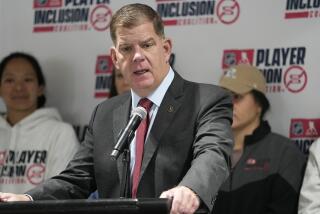For NHL, It’s Back to Work : Hockey: Despite some misgivings about the terms, players vote to ratify new six-year contract. Shortened season opens Friday.
- Share via
NEW YORK — Monday night, when they took a break from negotiations and went out to dinner, Bob Goodenow expected the NHL season to be canceled because he and Commissioner Gary Bettman couldn’t finish a new collective bargaining agreement.
“At one point, I turned to Gary and said, ‘What hobby are you going to take up?’ ” said Goodenow, executive director of the NHL Players Assn.
Hobbies will have to wait until next summer. It’s back to work for the NHL’s 700 players, who on Friday ratified a six-year contract that Bettman and Goodenow had agreed upon two days earlier and which had been recommended by the union’s negotiating committee.
Because some issues are unresolved, the document the two leaders signed Friday--105 days after the lockout began on Oct. 1--was a memorandum of understanding and not a classic collective bargaining agreement. However, it is legally binding.
The majority of players on all 26 teams voted to accept the deal, and a union source said 85% of the voters approved it. Only 51% approval was needed. “It was strong,” Goodenow said of the margin of passage.
An overall count won’t be released until Monday, when all ballots are tallied. A small percentage of players hadn’t voted by the noon EST Friday deadline because they were in Europe or in transit back to their NHL cities.
The Mighty Ducks voted for it with “a significant majority” but it was not unanimous, said Stu Grimson, the assistant player representative.
“We knew it was over, more or less. This was just a formality,” the Kings’ Wayne Gretzky said. “We put our trust in the executive committee.”
But not everyone was happy.
Rob Blake, the Kings’ union representative, said, “I think you can safely say the majority voted for it. Definitely, there are some guys who are going to be hurt when there’s a line drawn on the transitional issues. There are major issues.”
Transition rules are provisions affecting players whose free agency or arbitration status differs under the new agreement.
The transition rules were completed Thursday. The highlights include:
--The approximately 150 players who requested to play out their options last summer will receive a one-year standard contract for this season and their previously negotiated salary. Those players will be subject to the new agreement this summer.
--Players who filed for salary arbitration last summer will be permitted to go to arbitration this season only. Comparable contracts will be limited to contracts signed as of Jan. 1, 1995. Those players will be subject to the new system this summer. Awards for entry-level players may not exceed $850,000.
--Rookies who have been drafted but not signed may sign contracts without a salary cap until the day of the 1995 draft. If they are still unsigned, they will have to sign under the cap. Any drafted but unsigned player who goes back into the draft or becomes a free agent can only sign under the cap.
--Rookies whose first contract has expired and are negotiating a second contract will be outside the entry-level cap. However, they will have no right to salary arbitration unless they qualify under the new eligibility rules and have at least three years of professional experience under NHL contract to be eligible for Group 2 free agency.
In addition, the waiver draft was rescheduled for Wednesday, and each team must submit a new protected list. The entry draft will be rescheduled later.
“I still think it is brutal,” Chicago Blackhawk center Jeremy Roenick said of the agreement, “but we want to play again.”
Brett Hull of the St. Louis Blues said players to give up too much in the areas of salary arbitration and free agency late in the talks.
“It’s a terrible deal,” Hull said. “We got completely beaten in the second part of that package, the part that took two days (to negotiate, last Monday and Tuesday), while the other part took over a year. . . .
“I think a lot of players in the league were feeling the pressure of not getting a paycheck. There were a lot of them who were worried about what would happen if the season was canceled.”
Goodenow rejected the notion that the union, in accepting limits on rookie and entry-level salaries and on salary arbitration, lost its battle with the NHL and paid too high a price to get the season started.
But he did acknowledge he paid for Bettman’s dinner Monday.
“Players are happy with the results in the context of the whole agreement,” Goodenow said. “Sure, we made some concessions, but that’s part of any negotiating process. A lot of the key issues and principles are there.
“There were some tough issues, but on balance, we feel comfortable with this. It does restrict arbitration and there is now pressure on entry-level salaries, but there is a balance at the other end, with free agency.”
Most training camps opened Friday, as players reported for physicals and began organized workouts. The Mighty Ducks held their first official practice since Sept. 29, at Blue Jay near Lake Arrowhead.
The NHL’s 78th season will begin next Friday with eight games, and the New York Rangers finally will get to raise their Stanley Cup banner. “Our fans have waited 54 years. Another three months is the blink of an eye,” said General Manager Neil Smith.
The season will end May 3, 24 days later than in the original 1994-95 schedule. Each team will play a 48-game schedule, the NHL’s shortest since the 1941-42 season. The playoffs will begin May 6.
* Staff writers Lisa Dillman and Robyn Norwood contributed to this story.
More to Read
Go beyond the scoreboard
Get the latest on L.A.'s teams in the daily Sports Report newsletter.
You may occasionally receive promotional content from the Los Angeles Times.







